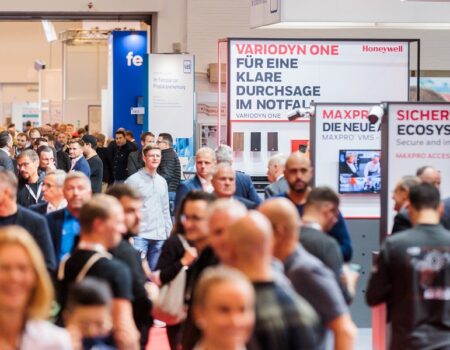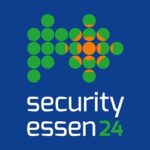Euralarm Symposium 2019: Beyond the Horizon begins today

Euralarm Symposium 2019 was held on May 13th in Madrid. It was the moment that Euralarm presented its priorities and challenges for the upcoming years. General Director Paul van der Zanden introduced Euralarm’s new strategy document for 2019 to 2024 to the audience by putting it into perspective with the developments within Brussels.
There is so much going on in Brussels that is not communicated. Members of Euralarm are European citizens, whose profession in fire safety and security has made them leaders in their business based on knowledge. Their leadership is underlined by trusted and proven partners like Orgalim, CEN, CENELEC and key stakeholders from the EU, such as several Directorates General. The world in which Euralarm operates and especially the part that is involved in standardisation is complex. And apart from the complexity there are big changes going on in the field of technology and economy that shake up the world of standardisation. Think of cybersecurity or artificial intelligence and it will be clear that associations like Euralarm need to act in a swift and decisive way.
Based on its current position and on the strategic objectives of the association a number of priorities and challenges have been defined for Euralarm in the new EU legislative period 2019 to 2024. They are based on Europe-wide cooperation and will enable Euralarm to maintain and further improve its position in Europe. The four priorities and challenges were topic of the opening presentations that were held by Lance Rütimann, Chair of the Fire Section, Peter Massingberd-Mundy, member of the Fire Section and involved in many of the standardisation activities of Euralarm, Jon Koenz, Chair of the Services Section and Dominique Taudin, Chair of the Advocacy Committee.
Wealth of knowledge
Lance Rütimann’s presentation focused on Innovating through Research. He opened his presentation with a philosophical view – the Socratic Paradox – that there's a wealth of knowledge in so many areas, but yet we have still so much to learn. That is what research is all about: helping us to understand things and see behind the curtains for new solutions. What has that to do with the association's priorities? Our industry wants to stay leader in our business. That requires research, collaboration and cooperation. We have to stimulate others to bring their support to the table. Together we can identify the opportunities and understand the risks of emerging technologies. It requires investigating common challenges in the application of fire safety and security solutions to gain new insights on protection of life and assets in buildings. Therefore, we should also examine which qualifications, skills and expertise are needed in our industry and act on the findings. In order to make that happen, Euralarm urges the EU institutions and research bodies to work together. By developing partnerships between industry, testing houses, universities and research institutes priority areas could be identified more easily and efforts coordinate more seamlessly. It would enable all parties to maximise the potential of EU research programmes under Horizon 2020 and its successor.
Standards: the heart of our industry’s success
Peter Massingberd-Mundy took up the gauntlet of talking about fast and flexible standardisation. The title may seem to encompass both a contradiction and an oxymoron but standards are at the core of everything we do. With a world that becomes more and more connected, standards need to allow for this connectivity as well as being well connected and clearly structured in themselves. Robust standards for products and services are at the heart of our industry’s success but to continue serving the interests of customers, society and the industry, a faster and more flexible standards-setting system is needed. A system that is agile and accommodating of technical changes and innovations will help Euralarm members and other parties to respond rapidly to customers’ demands and deliver the highest levels of safety and security to citizens. This would put European companies on the best footing to serve global markets. Such a fast and flexible standards-setting system requires close cooperation between the key players – Euralarm, European Commission, standards organisations, approval bodies and other organisations – who together can write the standards that will deliver the highest quality products and services as efficiently as possible. Therefore, Euralarm urges the EU institutions to work together to deliver an efficient system that responds to market needs. Among the areas where progress would be required over the next five years are the setting, improving or extending of standards; for interoperability between building systems, between remote services, for the residential market (e.g. combining security and home-assisted systems) and for the competency of personnel and the quality of the services they provide.
Cooperation to profit from digitalisation
Whether active in fire safety or security, the building and construction industry or process automation: digitalisation is all around us. It has an impact on our industry but also offers opportunities and challenges. How to seize these opportunities of digitalisation was the topic of the presentation that was given by Jon Koenz. Digitalisation is already having a huge impact on our industry and this trend will continue to grow in the future. New technologies such as cybersecurity, the Internet of Things (IoT) and Artificial Intelligence (AI) will drive this trend to become more and more crucial for our sector. All participants in the value chain need to be sensitised to the importance of increasing resilience in the face of cyber-attacks. At the same time, the potential of AI needs to be carefully assessed to maximise opportunities this technology offers. That is only possible when knowledge partners such as Euralarm and EU institutions work closely together. That cooperation will allow them to make rapid progress on a Europe-wide voluntary certification mark (quality label) that shows that all reasonable protection measures against cyber-attacks have been taken. That cooperation is also needed to advance work on standards for cybersecurity, IoT for fire and security systems and Building Information Modelling (BIM). Last but not least, the parties involved should cooperate to promote education as an investment in the future.
Fragmented certification landscape
The fragmented landscape for testing and certification of their products and services was the topic of the presentation of Dominique Taudin. Since Euralarm members are facing this landscape they are charged with higher costs since they have to submit multiple applications in several countries for the same product or service. But there are more than just costs. There is also the risk of having an inconsistent approach to testing and certification across the EU. This situation could be improved by the introduction and use of pan-European testing, auditing and certification processes. Not only would it reduce administrative burdens but also save costs for fire safety and security companies, many of which are small- and medium-sized enterprises. It would also help achieving real EU’s single market for fire safety and security. But there is also another, perhaps more important aspect when it comes to the future of European companies. A European wide process would allow companies to avoid uncertainty and encourage investment if they only had to submit their products and services for testing and certification to a single authority. To turn this fragmented landscape into a uniform and organised environment Euralarm wants to cooperate closely with EU institutions, test laboratories and certification bodies. It should result in achieving consistent, objective and repeatable processes for testing across Europe and, over the longer term, developing a single testing and certification scheme for electronic security equipment. In the short term, Euralarm calls on stakeholders to intensify work between leading laboratories on Multilateral Test Result Recognition Agreements (MTRA). Fore services, the transition process from a fragmented to a consistently organised environment will require a better exchange of information about national training and certification schemes for the personnel involved in planning and design, engineering, installation and hand over, maintenance and repair of fire safety and security systems.
Accelerating innovation through standardisation
Keynote speaker during the Euralarm Symposium 2019 was Alberto Garcia-Mogollon, Head of Innovation Policy of BSI. He took the visitors on a 'tour' during his presentation on building confidence and accelerating innovation through standardisation. With a new generation of products and services requiring the integration of complex, digital technologies and new production processes that need to scale up at faster rates the role of standardisation is expanding rapidly. It fulfils the ever-increasing need to demonstrate confidence in performance. To maximise the benefits from standardisation Alberto proposed to have a strategic approach. The type of standards may vary according to the maturity and nature of technology and the industry sector where it applies to. The standards process itself should be agile. With the right value proposition based on outputs and services a fit-for-purpose set of standards can be developed to be used across industries with different characteristics. To maximise the value from and creating value for the communities engaged in standards development there should be a collaborative approach toward the content development. And by creating a state-of-the-art environment for standards development, the efficiency, speed and ease of use are ensured.
In relation to the needs of innovative industries Alberto proposed a process of fast iterations with faster development times and publication schedules for each iteration, an output that is designed to elicit feedback and discussion and enhanced feedback from the user community to aid development, improving speed and quality. Important to remember: the future of standards is digital, with self-regulating autonomous standards fed in real-time by data from 'smart' devices, potentially connected to smart contracts, e.g. leading to continuous conformance or regulatory audit. For accelerating innovation through standardisation, it is important that both the technology landscape and industry needs are understood and that coordination across fragmented international knowledge networks is realised. Also, innovators should be educated on the role and value of standards while mechanisms should be developed to encourage participation of end users and SME’s and enabling public participation and oversight.
by the Editorial Staff
In the photo: Lance Rütimann, Chair of the Fire Section














